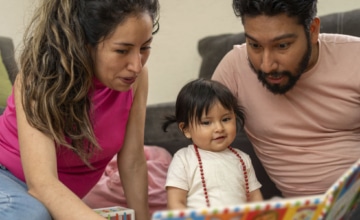About 40% of parents told us they wished they could do a better job of not yelling or raising their voice so quickly with their children.
“Even if I yell, my kids don’t listen.” “The only way my kids listen is if I yell.” Either way, it’s no fun. If you’re looking for a better way to be heard this year, you are not alone. Our national parent survey, Tuning In, found that almost 60% of parents said they struggle with figuring out the most effective way to discipline. And about 40% of parents told us they wished they could do a better job of not yelling or raising their voice so quickly with their children. The truth is that many of us yell, even though we know it’s not the best way to shape our children’s behavior.
What to do in the moment when you’re about to lose it?
Many of us go from “0 to 60” with our kids way too fast. And as much as we want them to change, the only behavior we can truly control is our own. First, make the decision to stop yelling and commit to it. Write it down or post it on your refrigerator; anything that will help you remember your commitment. Then, make a plan to help you follow through, because behavior change is hard and only you know what will help. Maybe it will take some experimenting—for some it’s a mindfulness practice, meditation, or yoga. Opening up to friends who know what it’s like to raise little ones, or trading childcare so you can get a break, can also really help.
When your toddler is losing it and you feel like you might too, try one of these approaches:
1. Double-check that your expectations are reasonable. Our Tuning In survey found that parents of young children have an “expectation gap” that leads them to thinking that toddlers have more self-regulation than is actually possible at age 2. Remember that toddlers still need a LOT of help with sharing, calming down, and expressing their feelings appropriately. Trust that they will get there and do your best to model the behavior you want to see.
2. Be specific. Keep instructions specific and clear: “You have two more minutes to play. I will set the timer on my phone.” Try, “Put the blocks in the basket” instead of, “time to clean up.”
3. Tell children what they can do, not just what they can’t. You can walk or hop inside (instead of “no running”). You can choose what you want to eat on your plate (instead of “no more snacks”).
4. Make eye contact and use loving touch. Kneel down to your child’s level. Make eye contact and gently touch their shoulder or arm to get their attention. Then say: We are leaving the park now. Please hop into your stroller.
5. Offer choices. When toddlers are upset, choices can sometimes be calming. But be sure to offer choices that still work for you as a parent. If your toddler wants to wear a sundress in January, you might (calmly) say: You have choices about what to wear. You can choose the long-sleeve dinosaur shirt or the long-sleeve striped shirt. Or you can look for a compromise: You can wear a long shirt under your sundress. Which one would you like?
6. Get quiet instead of loud. Whispering can be attention-getting. You can even add an element of imaginative play: Let’s see if we can put the toys away really quietly so your stuffed animals don’t wake up!
7. Do something silly. Young children love silliness. Anything that gets the laughter flowing will be helpful during tough moments—try a silly robot voice or hop like kangaroos while walking to the car. Pretend to put a sock on their nose while getting dressed. Use a fun moment to break the tension.
8. Don’t be afraid to take a time-out (for you!). Everybody gets pushed to the edge once in a while. It’s okay to tell your toddler, “I feel very frustrated right now. I need a break so I can do some good thinking. I’ll be back in two minutes.” And then go to the bathroom or your bedroom and take a few deep breaths before you return.
Be kind to yourself.
Making changes is hard, so be kind to yourself. There will be times when you mess up. That’s okay. Holding yourself accountable in a kind, firm way is great modeling for your child: “Oops, Daddy didn’t mean to yell. What I meant to say was, you need to put your cars in the bin now or we won’t have time for a story before bath.” These moments of reconnection help to build a strong bond between you and your little one, even during the tough times.






